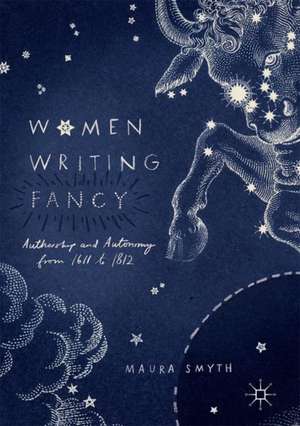Women Writing Fancy: Authorship and Autonomy from 1611 to 1812
Autor Maura Smythen Limba Engleză Hardback – 25 iul 2017
This book brings to the foreground the largely forgotten “Fancy” of the seventeenth and eighteenth centuries and follows its traces as they extend into the nineteenth and twentieth. Trivialized for its flightiness and femininity, Fancy nonetheless provided seventeenth- and eighteenth-century women writers such as Margaret Cavendish, Aphra Behn, Delarivier Manley, Eliza Haywood, and Anna Barbauld a mode of vision that could detect flaws in the Enlightenment’s patriarchal systems and glimpse new, female-authored worlds and genres. In carving out unreal, fanciful spaces within the larger frame of patriarchal culture, these women writers planted Fancy—and, with it, female authorial invention—at the cornerstone of Enlightenment empirical endeavor. By finally taking Fancy seriously, this book offers an alternate genealogy of female authorship and a new framework for understanding modernity’s triumph.
| Toate formatele și edițiile | Preț | Express |
|---|---|---|
| Paperback (1) | 526.38 lei 38-44 zile | |
| Springer International Publishing – aug 2018 | 526.38 lei 38-44 zile | |
| Hardback (1) | 587.53 lei 6-8 săpt. | |
| Springer International Publishing – 25 iul 2017 | 587.53 lei 6-8 săpt. |
Preț: 587.53 lei
Preț vechi: 691.20 lei
-15% Nou
Puncte Express: 881
Preț estimativ în valută:
112.44€ • 122.09$ • 94.45£
112.44€ • 122.09$ • 94.45£
Carte tipărită la comandă
Livrare economică 23 aprilie-07 mai
Preluare comenzi: 021 569.72.76
Specificații
ISBN-13: 9783319494265
ISBN-10: 3319494260
Pagini: 255
Ilustrații: X, 295 p.
Dimensiuni: 148 x 210 x 25 mm
Greutate: 0.52 kg
Ediția:1st ed. 2017
Editura: Springer International Publishing
Colecția Palgrave Macmillan
Locul publicării:Cham, Switzerland
ISBN-10: 3319494260
Pagini: 255
Ilustrații: X, 295 p.
Dimensiuni: 148 x 210 x 25 mm
Greutate: 0.52 kg
Ediția:1st ed. 2017
Editura: Springer International Publishing
Colecția Palgrave Macmillan
Locul publicării:Cham, Switzerland
Cuprins
.- Introduction Fancy: The Untold Story of an Aesthetic Rogue.- Threads That Go Nowhere in The Tempest and The New Atlantis.- Finding Fancy in Leviathan and Paradise Lost.- Margaret Cavendish’s Fashioning of Fancy.- Going Undercover with Aphra Behn’s ‘Female Pen’.- Plotting Fancy in The New Atalantis and Fantomina.- Fancy and the Tinctures, Tones, and Flavors of History.-The Persistence of Fancy.
Recenzii
“It offers not only an entirely new way of thinking about how creativity was conceptualized in the early modern period, but also a model of fine-grained, imaginative textual criticism that gives proper consideration to the fleeting, overlooked, and imperfect spaces in which such creativity was practiced by women.” (Natasha Simonova, Early Modern Women Journal, Vol. 14 (1), 2019)
Notă biografică
Maura Smyth is Assistant Professor of Liberal Arts at Massachusetts College of Art and Design. Previously, she was a Junior Fellow at the Harvard Society of Fellows
Textul de pe ultima copertă
This book brings to the foreground the largely forgotten “Fancy” of the seventeenth and eighteenth centuries and follows its traces as they extend into the nineteenth and twentieth. Trivialized for its flightiness and femininity, Fancy nonetheless provided seventeenth- and eighteenth-century women writers such as Margaret Cavendish, Aphra Behn, Delarivier Manley, Eliza Haywood, and Anna Barbauld a mode of vision that could detect flaws in the Enlightenment’s patriarchal systems and glimpse new, female-authored worlds and genres. In carving out unreal, fanciful spaces within the larger frame of patriarchal culture, these women writers planted Fancy—and, with it, female authorial invention—at the cornerstone of Enlightenment empirical endeavor. By finally taking Fancy seriously, this book offers an alternate genealogy of female authorship and a new framework for understanding modernity’s triumph.
Caracteristici
Revitalizes an important but dismissed trope in literary history and the history of gender studies Examines a wealth of source material including works by Margaret Cavendish, Aphra Behn, Delarivier Manley, Eliza Haywood, and Anna Barbauld Re-conceptualizes the vitality of Fancy as a feminist mode of thought, becoming the first full-length study to do so

















